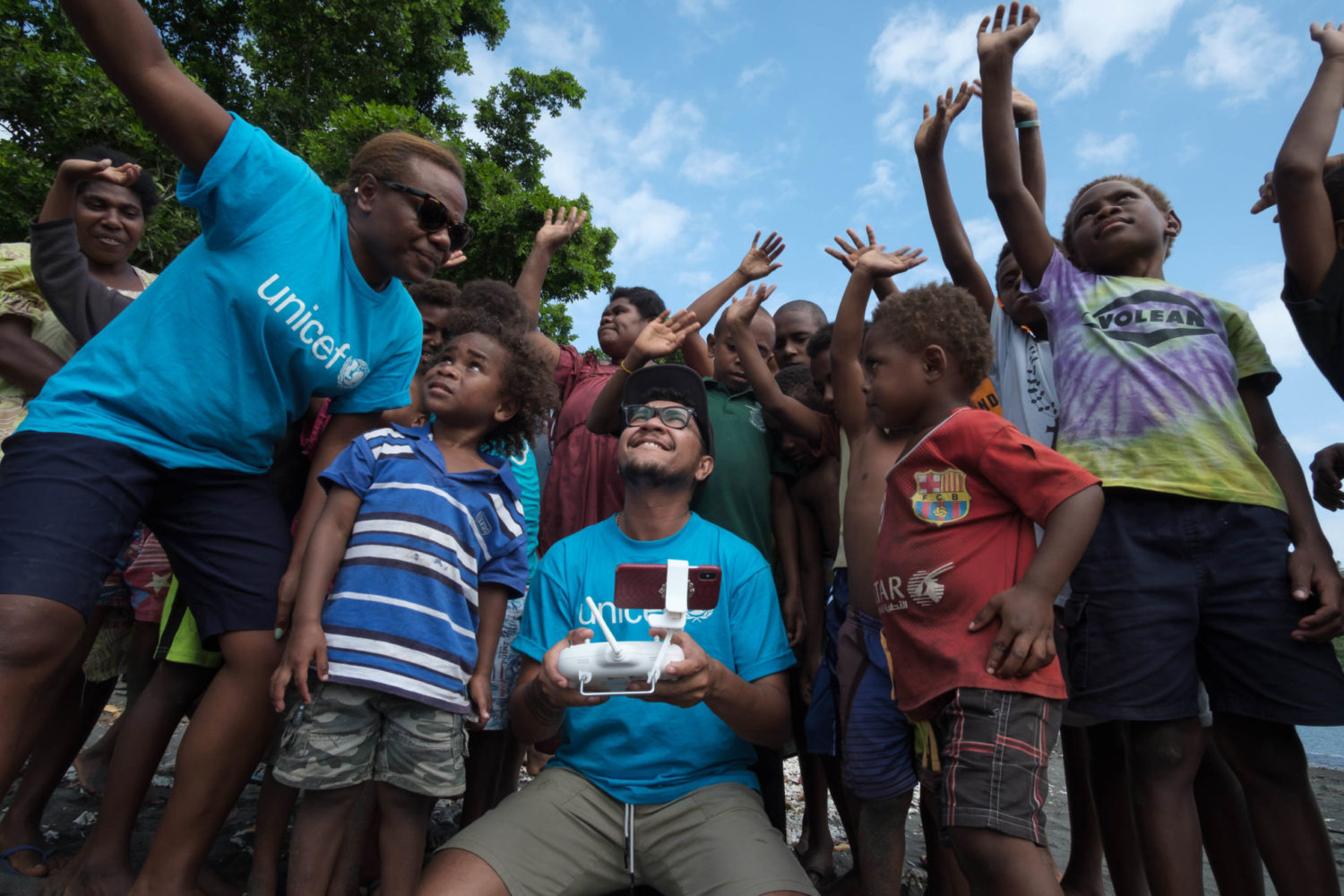Download photos and broll here
18 December 2018 –One month old Joy Nowai, today became the world’s first child to be given a vaccine delivered commercially by drone in a remote island in the South Pacific country of Vanuatu.
The vaccine delivery covered almost 40 kilometers of rugged mountainous terrain from Dillon’s Bay on the west side of the island to the east landing in remote Cook’s Bay, where 13 children and five pregnant women were vaccinated by Miriam Nampil, a registered nurse. Cook’s Bay, a small, scattered community that does not have a health centre or electricity, is only accessible by foot or small local boats.
“Today’s small flight by drone is a big leap for global health,” said Henrietta H. Fore, UNICEF Executive Director. “With the world still struggling to immunize the hardest to reach children, drone technologies can be a game changer for bridging that last mile to reach every child.”
Vaccines are difficult to transport as they need to be carried at specific temperatures. Warm weather locations like Vanuatu, which is made up of more than 80 remote, mountainous islands stretching across 1,300 kilometers and with limited roads, is a particularly difficult location for vaccine delivery. As a result, almost 20 per cent of the country’s children – or 1 in 5 – miss out on their essential childhood vaccines.
“It’s extremely hard to carry ice boxes to keep the vaccines cool while walking across rivers, mountains, through the rain, across rocky ledges. I’ve relied on boats, which often get cancelled due to bad weather,” said Miriam Nampil, the nurse who injected the world’s first drone-delivered vaccine. ”As the journey is often long and difficult, I can only go there once a month to vaccinate children. But now, with these drones, we can hope to reach many more children in the remotest areas of the island.”
During the drone flight on Erromango, the vaccines were carried in Styrofoam boxes with icepacks with a temperature logger. An electronic indicator is triggered if the temperature of the vaccines swings out of acceptable range.
In tests last week, the Ministry of Health, with support from UNICEF, conducted drone trials with two drone operators, Swoop Aero and WingCopter, using test payloads. Swoop Aero, the Australian company responsible for today’s successful drone delivery, passed the first phase of trials by landing the payloads within 2 meters of the target after a 50-km flight over numerous islands and way points.
This is also the first time globally that a government is contracting a commercial drone company to transport vaccines to remote areas. The drone operators are selected after a bidding process, and as per the contract, they are held accountable and not paid if they don’t deliver.
In the long term, the Government of Vanuatu is interested in integrating the drone delivery of vaccines into their national immunization programme and using drones more widely to distribute health supplies. The data from the trials will also be used to show how drones can be used commercially in similar settings around the world.
“Today’s first-of-a-kind vaccine delivery has enormous potential not only for Vanuatu, but also for the thousands of children who are missing out on vaccines across the world,” added Fore. “This is innovation at its best, and shows how we can unlock the potential of the private sector for the greater good of the world’s children.”
######
Notes to editors
Download photos and broll here
* Vanuatu Vaccination Coverage Survey 2016.
The project is led by Vanuatu’s Ministry of Health and the Civil Aviation Authority of Vanuatu, with support from UNICEF, the Australian Government Department of Foreign Affairs and Trade’s (DFAT) innovationXchange, and The Global Fund to Fight AIDS, Tuberculosis and Malaria.
For more information, please contact:
Unicef UK Media Team, 0207 375 6030, [email protected]
Morwenna Darby, 0207 375 6124, [email protected]
About Unicef
Unicef is the world’s leading organisation for children, promoting the rights and wellbeing of every child, in everything we do. Together with our partners, we work in 190 countries and territories to translate that commitment into practical action, focusing special effort on reaching the most vulnerable and excluded children, to the benefit of all children, everywhere.
Unicef UK raises funds to protect children in danger, transform their lives and build a safer world for tomorrow’s children. As a registered charity we raise funds through donations from individuals, organisations and companies and we lobby and campaign to keep children safe. Unicef UK also runs programmes in schools, hospitals and with local authorities in the UK.
For more information please visit unicef.org.uk


